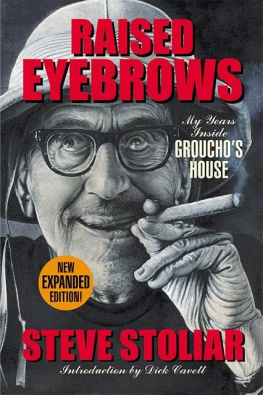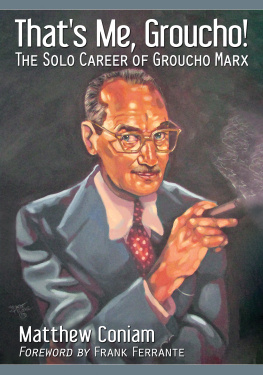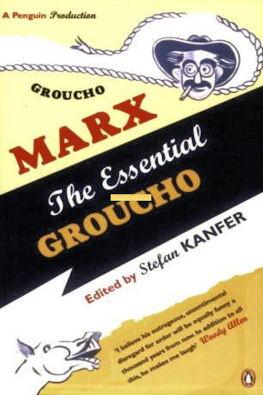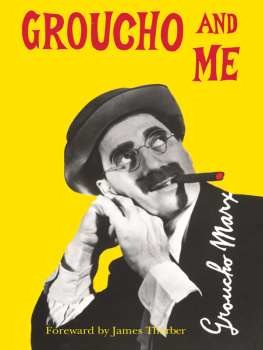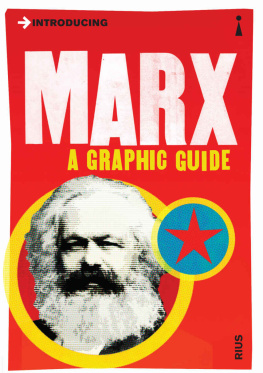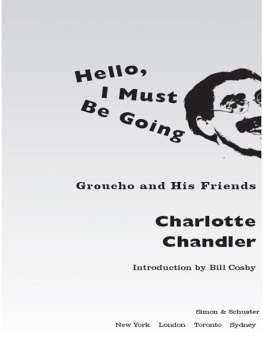GROUCHO MARX

Groucho Marx
The Comedy of Existence

LEE SIEGEL

Frontispiece: Groucho Marx, ca. 1920S1930S. Copyright Corbis.
A portion of was first published in Newsweek.
Copyright 2015 by Lee Siegel.
All rights reserved.
This book may not be reproduced, in whole or in part, including illustrations, in any form (beyond that copying permitted by Sections 107 and 108 of the U.S. Copyright Law and except by reviewers for the public press), without written permission from the publishers.
Yale University Press books may be purchased in quantity for educational, business, or promotional use. For information, please e-mail (U.K. office).
Set in Janson oldstyle type by Integrated Publishing Solutions.
Printed in the United States of America.
Library of Congress Control Number: 2015941636
ISBN 978-0-300-17445-8 (cloth : alk. paper)
A catalogue record for this book is available from the British Library.
This paper meets the requirements of ANSI/NISO Z39.48-1992
(Permanence of Paper).
10 9 8 7 6 5 4 3 2 1
For Harper
CONTENTS
GROUCHO MARX

Introduction: A Fateful Condition
And we are here as on a darkling plain
Swept with confused alarms of struggle and flight,
Where ignorant armies clash by night.
Matthew Arnold, Dover Beach
MRS. RITTENHOUSE: Captain Spalding, you stand
before me as one of the bravest men of all times.
SPALDING: Alright, Ill do that.
Animal Crackers
THE MARX brothers grew up at the turn of the twentieth century in Yorkville, a neighborhood on Manhattans Upper East Side that was teeming with European immigrants. Unlike the Lower East Side, however, where the preponderance of eastern European Jews settled and created something like a parallel Jewish universe, or to a lesser extent, the Grand Concourse in the Bronx, which became home to German Jews, Yorkville was not a Jewish enclave. It was most heavily populated by Germans. The small number of Jews who settled there remained a minority, as did the roughly thirteen hundred Russian and Polish Jews who moved around this time slightly north into Harlem, which was populated mostly by Irish and Germans. Groucho would have walked out onto East 93rd Street, where the family finally settled, and heard a cacophony of German, Polish, and Russian, as well as Spanish spoken by Yorkvilles growing population of Cubans. From the beginning, the Marx brothers experienced language as a fluid, shifting, arbitrary social phenomenon.
Born in October 1890, Julius Henry Marx was the third of what would be five surviving sons. A first child, named Manfred, died of tuberculosis before he reached his first birthday. Though the Marx Brothers are now synonymous with American urban Jewish humor, they followed a different trajectory from other Jewish immigrants right from the start.
The Marxes mother, Minnie Schoenberg, met their father, Simon Marx, at a dancing school in New York where Simon was an instructor. Ambitious to immerse herself in American life, Minnie had enrolled in the school to learn the latest dance steps. She had emigrated with her parents and siblings from Germany, while Simon had come to America from Alsace-Lorraine, a part of the German Empire that was contested by Germany and France, and where a mlange of German and French dialects was spoken. The eclectic language situation at home reflected the potpourri of languages spoken in the neighborhood. The two newlyweds communicated half in German, half in English, but never in French. Simon had effectively shunned his past, which included French language and culture, and his family, about which he refused to speak. Noticing that their father had rejected the totality of his French background, his precociously contrarian sons dubbed him Frenchie.
After living briefly on the Lower East Side, Minnie and Frenchie migrated up the island and eventually moved to a three-bedroom apartment at 179 East 93rd Street, where they raised their sons. Minnies father, Lafe, who had been a professional magician in Germany, and her mother, Fanny, who had played the harp in Lafes magic act, both came along to live with the young couple. The brothers zany cinematic worlds were not much different from their material origins. Groucho remembers their apartment like this:
We had a crowded household in our Yorkville Shangri-La on New Yorks Upper East Side. In addition to five brothersChico, Harpo, Groucho, Gummo and Zeppo, in the order of our agethere were my mother and father,... my mothers father and mother, an adopted sister and a steady stream of poor relations that flowed through our house night and day.
One early biographer of the Marx Brothers, Kyle Crichton, described the apartment as a bus station. He goes on: The door was never locked, there was a pot of coffee forever simmering on the stove, and the neighbors wandered in and out at random. Meanwhile, Frenchie had set up his tailor shop in a small room adjacent to the kitchen. Amid the chaos, one day Minnie discovered her compulsively philandering husband in bed with one of her cousins. In front of her sons, she proceeded loudly and dramaticallyshe had changed her first name from Minna to Minnie, after the famous stage actress, Minne Maddernto blame her cousin rather than her husband.
Minnies parents, long retired from show business, performed for the children, one result being that Adolph took a fateful liking to Fannys portable harp. When Minnies brother Al, a famous vaudevillian known as Al Shean, came to visit, he must have felt as if he was walking into a theater. It was only natural that the brothers revered him as a kind of household god.
The death of their firstborn child seemed to send Minnie and Frenchie into perpetual parental motion. They tended to gravitate toward the sons with the largest personalities and the greatest need for attention. Chico, a pathological gambler and thief who often pawned the familys possessions to subsidize his habit and to pay off his debts, was Minnies favorite son. AdolphHarpoa quiet and dreamy child who left school at around the age of eight after being pronounced slow by his teachers and brutalized by some Irish-American bullies, was the apple of Frenchies eye. Gummo, a sickly boy, also got a generous share of his parents attention, as did Zeppo, the last of Minnie and Frenchies children. Julius, the unassuming and seemingly unremarkable middle child, was largely lost in the familial tumult, unseen and unheard.
His route into show business had a lot to do with the fact that Minnie was a tough audience to win over. Young Julius yearned to be a doctor, but his talk of entering the medical profession fell on his mothers deaf ears. She forced him to leave school for good in the seventh grade so that he could go to work in Heppners wig factory, in order to make up for the income his brother Chico was throwing away during his gambling sprees. Though not exactly a step toward a premed program, the wig factory was fortuitously located in New Yorks theater district. One night Groucho showed up at home with a box of womens wigs that he was scheduled to deliver the following morning, and he and Harpo decided to have some fun. Tearing open the box, they relieved it of its contents and spent hours delighting themselves by preening and primping before a mirror in one wig after another. Finally Harpo had the brainstorm of dressing up like a prostitute and barging in on some relatives who were playing cards in an apartment nearby. One of the relatives was a germophobe whom the other family members had dubbed Mr. Clean. Harpo went to kiss him. Chaos ensued, with Minnie, accompanied by a few other women relatives, sweeping into the room and ordering the lady-of-the-evening to leave the premises. When Harpo pulled off his wig and revealed himself, however, Minnie lavished him with praise.
Next page

